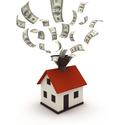By Susanne Trimbath and Juan Montoya
We just passed an era when the “American Dream” of home ownership was diminished as the growth of home prices outpaced income. From 2001 through 2006, home prices grew at an annual average of 6.85%, more than three times the growth rate for income.
This divergence between income and housing costs has turned out to be a disaster, particularly for buyers at the lower end of the spectrum. In contrast, affluent buyers – those making over $120,000 – the bubble may still have been a boom, even if not quite as large as many had hoped for. read more »


















